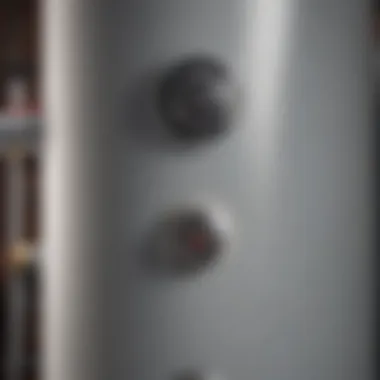Homeowners Insurance Coverage for Hot Water Heaters


Intro
Homeowners insurance serves as a safeguard for many assets within a household, but one often overlooked aspect is the coverage for hot water heaters. These appliances play a vital role in daily living, providing hot water for cooking, cleaning, bathing, and more. Understanding how homeowners insurance interacts with hot water heaters is essential for homeowners, especially as disputes about coverage can arise unexpectedly.
Determining whether your policy covers a hot water heater involves delving into various components of your homeowners insurance. It is important to examine individual policies, recognizing that not all insurance policies understand coverage for appliance failures in the same way.
By examining what constitutes typical homeowners insurance coverage and evaluating factors such as policy exclusions and maintenance requirements, homeowners can gain valuable insights. This enables informed decision-making in terms of risk management and advocating for appropriate coverage.
As this article unfolds, key points will be unpacked regarding hot water heater coverage, factors affecting representation in policy documents, and critical insights into ensuring these appliances are protected effectively.
Overview of Insurance and Coverage Factor
When discussing homeowners insurance, understanding the various components relevant to hot water heaters is critical. These appliances can be subject to different types of incidents, and knowing how coverage works can save homeowners time and money.
- Standard Coverage Elements: Most homeowners insurance will typically cover sudden mishaps such as damage due to burst pipes caused by freezing temperatures or sudden appliance failure that leads to property damage.
- Exclusions to Consider: On the contrary, several policies delineate clear exclusions. Deliberate neglect or lack of maintenance is a common exclusion. If a hot water heater fails due to neglect over time, claims can likely be denied, leaving homeowners unexpectedly liable for repairs or replacements.
- Age and Condition: The age of your hot water heater might influence coverage perception. Older appliances may present a greater risk of failure, prompting insurers to apply stricter guidelines, leading to higher premiums.
By dissecting these aspects, homeowners can strategically evaluate policies, choosing coverage that truly aligns with their needs and future risk planning. This proactive methodology can ultimately mitigate undesirable surprises.
Homeowners should review their policies at least once a year, contemplating their specific needs and the ages and conditions of their appliances and surrounding infrastructure.
Key Takeaways for Homeowners
- Read Your Policy Carefully: Knowing your coverage is vital. Take time to inspect your homeowners insurance policy conditions, particularly sections that may detail coverage for appliances.
- Address Maintenance Issues Promptly: Regular maintenance reduces risks of significant failures and helps in supporting coverage eligibility.
- Communicate with Your Insurer: Building a rapport with your insurance provider can lead to a better understanding of your policy
- Consider an Endorsement or Rider: If coverage is lackluster, an endorsement may bolster protection regarding specific appliances.
In summary, understanding homeowners insurance for hot water heaters both shields and empowers. Knowing that a hot water heater can incur risks of damage or failure gives homeowners the upper hand in preparing, preventing losses, and ensuring they are justly covered when issues arise.
Preamble
Navigating the world of homeowners insurance can be overwhelming. Many homeowners assume that their insurance covers all appliances, including hot water heaters. Yet, the reality of policy stipulations can differ greatly based on terms and conditions. This article aims to illuminate these details, helping homeowners comprehend how to shield their investments adequately.
Homeowners need to consider specific elements around insurance provisions: incidences of common water heater failure, the typical exclusions imposed by insurers, and how maintenance impacts coverage eligibility. Recognizing these considerations is advantageous, especially if disaster strikes. Prompt decisions can dictate how effectively a homeowner can respond to damage and losses. Moreover, with knowledge of coverage limits, homeowners will be better equipped to advocate for favorable policies.
Ultimately, good insurance protection for hot water heaters acts as a safety net. It can reduce the financial burden when faced with substantial repair or replacement costs. This piece will provide a thorough examination of how homeowners, families, and students can navigate their insurance plans effectively to include robust coverage for their hot water heating system.
Homeowners Insurance Overview
Homeowners insurance serves an essential role in protecting what is likely a person's most significant investment — their home. While many homeowners perceive it as a mere safety net against damage, it encompasses broader aspects that safeguard against various risks associated with property ownership. Understanding the overview of homeowners insurance provides clarity on its functionality and significance in maintaining peace of mind in everyday living.
What Is Homeowners Insurance?
Homeowners insurance is a type of property insurance that covers losses and damages to an individual's residence, along with furniture, other assets, and legal liability for accidents that may occur on the property. It is not only a protective measure but also a lender requirement in many cases. Most potential home buyers recognize the necessity of this insurance to shield their financial interests.
Key Components of Homeowners Insurance
Structure Coverage
Structure coverage represents a significant element of homeowners insurance policies. It entails protection for the physical structure of your home against risks like fire, storm damage, or vandalism. This feature is a cornerstone for maintaining home value, ensuring that homeowners can restore or rebuild their property should an unforeseen event occur. Due to varied terminology, this coverage can sometimes also cover detached structures like sheds or garages, providing comprehensive safeguarding when it’s needed most.
Personal Property Coverage
Personal property coverage is integral to the homeowners insurance framework. This component ensures that personal belongings such as furniture, electronics, and clothing are safeguarded against accidents or theft. The emergence of short-term rental agreements or seasonal property use amplifies its necessity. Conversely, it’s vital to remember that certain high-value items may require supplemental coverage, exemplifying a unique aspect of this insurance that can warrant attention, depending on individual needs or lifestyles.
Liability Coverage


Liability coverage provides necessary protection against injuries or accidents that take place on your property. This provision covers legal fees and damages if guests file a lawsuit for injuries sustained. It is a prudent choice for homeowners, especially those with children or frequent visitors, as they bear host responsibilities. Without adequate liability coverage, an unforeseen event can financially cripple a homeowner and expose them to significant risks.
Additional Living Expenses
Additional living expenses coverage is often overlooked yet holds its importance. This coverage assists homeowners with living costs if their home becomes uninhabitable due to a covered loss, ensuring financial relief during emergencies. It can academically allow homeowners to maintain their lifestyle, moving forward without unnecessary burden. It is essential to have a firm grasp of its limits, though, as state-specified variances change the extent and duration of benefits.
Hot Water Heaters and Their Importance
Hot water heaters are essential components in modern homes. They provide immediate access to hot water for various needs such as cleaning, bathing, and cooking. Understanding the importance of hot water heaters extends beyond their immediate functionality to encompass their implications for homeowners insurance. This connection is crucial for safeguarding investments and ensuring homeowner peace of mind.
Understanding Hot Water Heaters
Hot water heaters come in different types and configurations. The most common types are conventional storage heaters and tankless options, each offering unique advantages.
- Conventional Storage Heaters: These heaters store a specific volume of hot water, ensuring a steady supply. However, they can waste energy if the stored water is not used quickly.
- Tankless Heaters: Unlike traditional heaters, these provide hot water on demand, which improves efficiency and reduces energy costs. Nevertheless, installation can be more complex and expensive.
The consideration when choosing a heater includes efficiency, storage capacity, installation costs, and overall space available in the home.
Common Issues Associated with Hot Water Heaters
Hot water heaters are not without their problems. Homeowners should be aware of the potential issues that could arise, such as leaking, heating failure, and corrosion.
Leaking
A leaky hot water heater can lead to significant damage in a home. The issue is often a result of wear or component failure. Water leaks can not only increase utility bills but can also damage floors, walls, or other property. Quick detection and repair are vital to minimize damage and maintain insurance eligibility.
Heating Failure
Heating failures occur when the heater does not warm the water effectively. This can disrupt daily activities and create inconvenience. The common causes include faulty thermostats or broken heating elements. While it's often repairable, repeated failures may signal a need for complete replacement, impacting home insurance needs in the long term.
Corrosion
Corrosion often affects the longevity of a water heater. It typically occurs when the protective coatings break down, leaving metal components exposed to moisture. This can lead to leaks and heating inefficiency. Homeowners need to be proactive about maintenance to avoid this, especially given that insurance claims may not cover damage from neglect.
Conclusion: Understanding the operational elements and common issues associated with hot water heaters is necessary for homeowners. This knowledge informs decisions regarding coverage, maintenance, and overall home safety.
Insurance Coverage for Hot Water Heaters
Understanding insurance coverage for hot water heaters holds significant value for homeowners. The primary focus is to elaborate on how different insurance policy aspects relate. Knowing your home's financial safety net can shape decisions with regards to managing risk.
Water heaters uniformly see high usage in homes, which naturally raises genuine concern over incidents involving them. Damage to these appliances could result in costly repairs or replacements. Therefore, the intersections between homeowners insurance and hot water heaters deserve detailed attention.
Emphasizing the benefits of having an adequate coverage strategy could lead homeowners to better protect their financial investments. Exploring common issues linked to water heaters can underline why proactive insurance processing is necessary.
Under What Circumstances Is Coverage Provided?
Homeowners insurance typically covers hot water heaters when damage results from unexpected events. Events commonly include incidents like fire damage, sudden leaks, or vandalism. Each of these scenarios highlights the need for safeguarding financial investments in appliances that sustain household daily life.
What Exclusions May Apply?
Understanding the exclusions tied to home insurance policies is crucial, especially regarding hot water heaters.
Negligence
Negligence, in this instance, refers to the homeowner's failure to maintain the hot water heater adequately. When claimants do not keep a proper maintenance record, it makes it evident that the necessary precautions were not taken. Insurance companies generally reject claims under this category, resulting in personal liability for repairs.


Lack of Maintenance
The lack of maintenance is often seen when homeowners ignore routine checks or cleaning on their appliances. This can lead to serious issues like leaks or, worse, complete failure of the water heater. Insurers lens this lack of care unfavorably. Homeowners can incur costly damages due to this exclusion burdening those who chose not to act while their appliance showed symptoms needing attention.
Wear and Tear
Natural wear and tear over time affects not just hot water heaters but various home systems. Flavoring the planning of meaningful replacement or repair is essential here. Many policies explicitly exclude wear and tear to avoid frequent claims due to an appliance exceeding its expected lifespan. Homeowners contemplating updates or replacements should note exposure risk involved attached to these terms.
Differences in Coverage Among Policies
Different policies encompass various coverage elements that dictate support for the homeowner’s needs, especially concerning hot water heater incidents.
Standard Policies
With standard policies, coverage tends to focus on basic protection against natural perils like wind or hail. In these cases, owners can expect a degree of support for damages incurred under unexpected conditions. However, broader coverage may not secure specific problems linked directly to the appliance under intentional supervision neglect. It largely hinges on individual home preferences and risk tolerance.
Comprehensive Policies
Comprehensive insurance, in contrast, seeks to protect appliances like hot water heaters against a wider spectrum of threats. This forms part of an umbrella safeguarding physical assets within the household. Comprehensive coverage may appeal to homeowners requiring reassurance and preparedness against, say, unexpected flooding or uncontrolled electrical faults commonly damaging water heaters.
Specific Endorsements
Specific endorsements enhance a standard or comprehensive policy leaving no room for errors or unexpected appeals by excluded appliances. Such endorsements enrich coverage at an added premium, allowing seamless reclamation should utilities fail or create damages rarely encountered incidentally. It directly increases settlement support through endorsements bolstered precisely for these appliances' care. Thus, acceptance of specific endorsements could construct precise financial safeguards aligned around the homeowner’s long-term plan and utility needs.
By understanding the provisions and exclusions specifically impacting hot water heaters, homeowners can take decisive steps in making informed insurances choices.
This framework encourages every homeowner to scrutinize what exactly their policies encompass and what they should carefully consider to achieve fully worded peace of mind and safety.
Filing a Claim for Hot Water Heater Damage
Filing a claim for hot water heater damage is a crucial process that homeowners should understand thoroughly. This knowledge equips you with the necessary tools to navigate through potential incidents involving your hot water heater and impacts financial responsibility following a loss. The effectiveness of the claims process hinges on understanding specific elements, benefits, and essential considerations.
If damage occurs to your hot water heater, depending on the circumstances and your homeowners insurance policy, you may need to file a claim timely. Understanding when and why to file a claim helps you manage expectations and helps alleviate potential stress associated with repairs or replacement.
Steps to Take After Damage Occurs
In the unfortunate scenario when your hot water heater sustains damage, it is important to approach the situation methodically. Here are critical steps to consider:
- Assess the Damage: Initially, evaluate the extent of the damage. Noticing leaks or heating failures should prompt immediate inspection.
- Shut off the System: If there are severe leaks or electrical issues, ensure to shut off the power supply to the hot water heater for safety.
- Document the Incident: Take photos or videos of the damage without starting repairs initially. This can prove essential when making your claim, as a clear visual record supports your case.
- Contact a Plumber: If it’s safe, reach out to a plumbing handyman to discuss the issue. A qualified expert can provide guidance on the best next steps.
- Communicate with Your Insurer: After proper assessment and ensuring safety, contact your homeowners insurance agent or company. Report the situation has unfolded, adhering to the suggested timeline for claims.
Documenting Damage for Claims
Documenting damage is arguably one of the most important aspects of the claims process. Taking meticulous notes helps your case significantly when presenting evidence to your insurance company.
- Take Date-Stamped Photos: Capture the damage with date-stamped evidence. Photos should convey detail, including any vital components linked to proof.
- Records of Interaction: Keep a log of any conversations with your insurer, plumber, and contractors. Having dates and times, along with detailed summaries of discussions and advice received, can support your claim effectively.
- Repair Estimates: Secure written estimates from licensed professionals to rectify the damage. Presenting these documents can help verify estimated coverage costs.
Timeline of the Claims Process
Navigating through insurance claims can take varying amounts of time based on numerous factors. Understanding a basic timeline for the claims process is beneficial:
- Initial Claim Submission: Upon informing your insurer about the damages, they may need ample time to process your claim. Expect anywhere between 5 to 10 business days for preliminary feedback.
- Assignment of an Adjuster: Post initial review, insurance companies typically assign an adjuster to evaluate your claim. This process may take 1 to 2 weeks, depending on the number of claims being handled.
- Adjuster's Report: After the assessment, an adjuster will present their recommendations—this should happen in about a week or two post-evaluation.
- Claim Resolution: The final step entails receiving either approval or denial of your claim, which generally occurs within a month. This time frame can vary according to extensive circumstances or issues.
By comprehending these stepwise elements, document processes, and timelines associated with filing a claim, you foster a smooth and organized method for managing unexpected damages electrically connected to your hot water heater.


Factors Influencing Premium Rates
Understanding how premium rates are determined is vital for homeowners evaluating their insurance options. Factors such as the age of the hot water heater and its type significantly affect premiums. By grasping these influences, homeowners can make informed choices, ensuring adequate coverage that aligns with their financial comfort.
Age of the Hot Water Heater
The age of a hot water heater plays a critical role in determining insurance premiums. Older models often have less nuclear efficiency and more operational risks, leading insurers to charge higher rates. Generally, water heaters have a lifespan of around 10 to 15 years. Once a heater gets past the 10-year mark, it falters in reliability and resource efficiency, raising alarm for insurers. As such, consumers should consider potential reductions in premiums for newly installed systems.
Type of Hot Water Heater
Hot water heaters can be placed into several categories, each affecting the associated insurance premium differently.
Tank vs.
Tankless When analyzing options ranging from tank to tankless units, tanks are usually cheaper to install. However, tankless systems can save homeowners money on energy bills due to their efficiency and on-demand water heating capabilities. Key characteristics show that while tank systems store a limited amount of water, tankless systems ignore that limitation, allowing for endless hot water without the heating times of tank units. In general, tankless systems may also carry higher upfront costs, influencing insurance rate evaluation. These choices bear consequences not only to utility expenses but also on estimates for insurance coverage, impacting premiums based on their longevity and maintenance needs.
Fuel Source
The classification of the fuel source, whether it is gas, electric, or solar, introduces many variables into premium calculations. Each fuel choice presents distinctive key characteristics and efficiency levels:
- Gas water heaters typically produce higher heat outputs and deliver hot water within the least time, striking a balance between initial expenditures and enduring costs.
- Electric counterparts tend to be less expensive during purchase. However, they come with increased electric bills during usage, influencing the decisions for homeowners seeking effective yet frugal strategies.
- Solar units reflect a growing pathway for energy-conscious households, proving beneficial for the environment. Yet they might command additional expense and care considerations.
Unique features of these sources affect the broader scope of costs involved in installation, energy consumption, and maintenance. Making informed decisions in equipment selection standard significantly assists in forecast outcomes.
It's clear that the model and resources apply pressure on premium rates, ultimately acting as signals to homeowners' insurance.
Selective evaluation of these factors arms homeowners with the knowledge to make decisions and potentially lower their premiums while assuring adequate coverage around their hot water heating needs.
Importance of Regular Maintenance
Regular maintenance of hot water heaters is crucial for both efficiency and the longevity of the appliance. Proper maintenance can significantly prevent unexpected failures and costly damages that may not always be covered by homeowners insurance. A proactive approach towards maintaining this equipment also contributes to telling the insurance company that you are a responsible homeowner.
Preventative Maintenance Tips
- Inspect Regularly: Routine checks for leaks, corrosion, or worn-out parts can help catch small issues before they escalate. Look around the unit and listen for unusual sounds.
- Flush the Heater: Sediment build-up can affect performance. Flushing the tank annually removes such deposits, ensuring proper functioning.
- Check the Anode Rod: This rod helps prevent corrosion. Insufficient rod condition will signal that it's time for a replacement, ideally every few years.
- Adjust the Temperature: Keeping the thermostat set below 120°F (about 49°C) can be safer and energy-efficient. High temperatures not only consume more energy but can also heighten the risk of leakage due to excess pressure.
- Inspect the Pressure Relief Valve: Testing this valve yearly ensures reliable operation. It should release pressure and prevent over-heating.
Remember, these preventative measures can effectively prolong the lifespan and optimize the usage of your hot water heater. Regular oversight saves money in the long run.
The Role of Maintenance in Insurance Claims
The relationship between maintenance and insurance claims is often overlooked. Most homeowners are not aware that if a hot water heater fails due to lack of maintenance, claims could be invalidated. Insurance policies generally expect homeowners to maintain their appliances adequately and may deny claims resulting from negligence.
Keeping a record of maintenance conducted can also support your case during a claim. This documentation demonstrates diligence in upkeep, which can aid in negotiations with insurance assessors.
In summary, taking maintenance seriously is not just for personal benefit but also continues to provide protections within the insurance realm. This proactive stance can lead to peace of mind, knowing you are minimizing risk.
Ending
In considering the importance of homeowners insurance coverage for hot water heaters, one must appreciate multiple dimensions of both the policy and the physical appliance itself. Understanding these factors can lead to prudent decisions that safeguard not only homeowner's finances but also the integrity of their property.
A key element to consider is the potential risks and consequences associated with an unprotected hot water heater. Given their critical role in daily routines, an unexpected failure or damage can disrupt home life and impose substantial repair costs. This reinforces the value of adequate insurance coverage to mitigate financial strain during dire situations.
Homeowners should review their insurance policies meticulously. Since various exclusions can apply, familiarity with terms regarding negligence, maintenance, and wear and tear is vital. Often, homeowners might assume they have coverage but find out too late that their specific circumstances are against policy provisions.
Additionally, regular maintenance plays a pivotal role in managing risk and insurance claims. Scheduled checks or preventive actions can enhance the lifespan of hot water heaters and reduce the likelihood of incidents that might require insurance intervention. Regular maintenance not only safeguards your investment but enhances the chances of successful claims if needed.
"Proactive engagement in policy understanding empowers homeowners to advocate effectively for suitable coverage options."
Lastly, understanding the landscape of different policy types can illuminate insights unique to each homeowner's situation. Standard, comprehensive, and specific endorsements result in varied shades of coverage that cater to an individual’s requirements. Thus, knowledge in this realm benefits homeowners immensely; it allows them to make informed choices best suited to their environment.
Summing it up, navigating the nuances of homeowners insurance concerning hot water heaters requires a balanced approach. It involves being well-informed, proactive, and analytical regarding policy details, associated risks, and maintenance practices. Such an approach not only minimizes risks, it empowers homeowners in managing their homes confidently.







